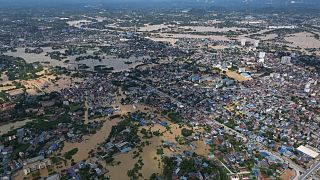Africa
East Africa is bracing for a third outbreak of desert locusts, with billions of the destructive insects about to hatch and threaten food supplies in a region already facing damaging rains and the coronavirus pandemic.
Spurred by favourable weather conditions, record numbers of locusts descended on East Africa since late 2019. Another wave is about to take to the skies despite the concerted use of pesticides.
“Tens of thousands of hectares of cropland and pasture have already been damaged across the Horn and East Africa,” the International Rescue Committee said in a report this month, noting even a small swarm could devour the same amount of food in a day as approximately 35,000 people.
In Ethiopia, locusts destroyed 1.3 million hectares of grazing land and nearly 200,000 hectares of crops between January and April, resulting in the loss of 350,000 tonnes of cereals, the East Africa regional organisation, said in a June report.
In February, Somalia, which like Kenya recently experienced heavy rains and flooding that left scores dead, had already declared a “national emergency” against the locust scourge.
So far East African neighbours Rwanda and Burundi have been spared the insects, which can migrate 150 kilometres in a day.
AGENCIES













02:02
African penguin faces extinction despite new protections
02:03
Africa’s freshwater fish under threat as stocks decline
Go to video
US federal government enters shutdown, raising fears of global uncertainty
01:12
White House says Trump supports renewal of African trade initiative due to expire
00:09
UN delegates use fashion to bring culture and tradition to global stage
02:31
Africa takes pride in hosting its first road cycling world championship